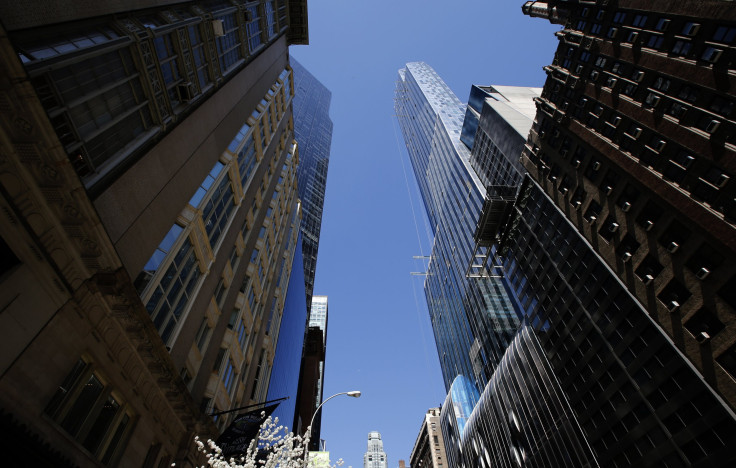US Commercial Mortgage Market On Verge Of Crumbling: Investor Tom Barrack

KEY POINTS
- Barrack predicts a wave of defaults by borrowers
- Barrack, is chairman and chief executive officer of Colony Capital, a real estate investment firm
- Delinquencies and defaults on commercial real estate loans may rise in the coming weeks
The multi-trillion dollar U.S. commercial mortgage market may be on the edge of collapse due to the indirect effects of the coronavirus pandemic
Real estate investor Tom Barrack warned that the country may witness catastrophic consequences if banks and government don’t take immediate action to prevent borrowers from defaulting.
“Loan repayment demands are likely to escalate on a systemic level, triggering a domino effect of borrower defaults that will swiftly and severely impact the broad range of stakeholders in the entire real estate market, including property and homeowners, landlords, developers, hotel operators and their respective tenants and employees,” Barrack wrote.
Barrack, who is also chairman and chief executive officer of Colony Capital Inc. (CLNY), a real estate investment firm based in Los Angeles, sees a chain reaction of margin calls, mass foreclosures, evictions and, perhaps, bank failures due to the virus-related shutdown of a great portion of the U.S. economy.
“To keep people employed, you have to support the employers,” he said. “The biggest part of employer expense is rent. When commerce stops and they can’t pay rent and they can’t pay interest on the debt, and then the banks and the intermediaries can’t pay their investors, it all collapses.”
Barrack further warned that the impact could be greater than what occurred in the Great Depression, and impact a wide range of players.
“Across the entire real estate ecosystem including construction, retail, healthcare, leisure and hospitality, and real estate services there are almost 63 million jobs at stake. This real estate ecosystem represents $7.1 trillion of [gross domestic product], out of $20.3 trillion total U.S. GDP,” he wrote.
Barrack partly praised the Federal Reserve for planning bond purchases, but said their programs are not enough to fix the “liquidity crisis” in the market for commercial mortgage-backed securities.
Barrack proposed his own rescue package, which would include: $500 billion of taxpayer funds to provide liquidity to the financial system; the suspension of mark-to-market accounting and certain loan-modification rules; delaying until 2024 a new accounting rule that governs the recognition of credit losses; and allowing banks leeway to offer mortgage loan forbearance.
“Immediate concerted action must be taken to fend off this crisis and avoid the need for a taxpayer-funded bailout of the real estate market and banks,” Barrack wrote. “In particular, the banks, mortgage [real estate investment trusts] and debt funds must agree on a collaborative solution -- implemented with the reinforcement and support of federal government policy -- to ensure stability moving forward.”
Barrack’s company is exposed to the real estate market. As of year-end 2019, Colony had $3.54 billion of assets in hospitality real estate and $725 million of debt and equity investments at Colony Credit Real Estate Inc (CLNC)., its publicly traded commercial mortgage REIT.
“What everybody needs is just a time out,” Barrack said. “Give them 60 or 90 days, let it all come back together, tack on that accrued interest to the end, and you solve the problem.”
Some real experts also think that delinquencies and defaults on commercial real estate loans may rise in the coming weeks and months due to the impact of coronavirus as owners of commercial property will find it hard to collect rents from cash-starved tenants.
Tom Fink, senior vice president and managing director at Trepp, a New York-based research firm that tracks the commercial mortgage-backed security, or CMBS, market, said: “Truth be told, nobody really knows, but [delinquencies are] going to go up. There’s no way they cannot go up. Everything we’ve seen is going to start showing up in the performance of real estate. But real estate is a lagging asset.”
The delinquency rate on Chicago-area CMBS loans is at about 2.4% currently, down from as high as 10.4% in early 2013.
CMBS loans represent about 20% of all outstanding multifamily and commercial debt. CMBS lenders essentially offer loans to landlords then pool a group of mortgages together and sell bonds, or commercial mortgage-backed securities, against them.
Hotels will likely be the most vulnerable CMBS borrowers since they rent rooms on a nightly basis for immediate income, while with other kinds of commercial real estate, landlords and tenants often sign multi-year leases.
Hotels have already lost a large amount of income as conventions, businessmen and tourists cancel reservations. Some hotels have even shut down entirely.
“The impact to our industry is already more severe than anything we’ve seen before, including Sept. 11 and the great recession of 2008 combined,” said American Hotel & Lodging Association President and CEO Chip Rogers.
But some CMBS loan servicers will likely offer extensions to beleaguered borrowers.
“If a guy has a loan that comes due in the next six months and he asks for an extension, the odds are pretty high that he’s going to get it,” Fink said. “Nobody has an incentive to be the one guy who says, ‘pay me the loan back or I’m going to take your property.’ You don’t want to be that guy.”
The Wall Street Journal noted that landlords and banks would bear the brunt of delayed rent and mortgage payments. Some property owners who don’t receive rental income could default on their mortgages.
“You’re going to have this [commercial real estate] blow up, too, and nobody’s even looking at it,” investor Carl Icahn said earlier this month.
Many commercial tenants have asked their landlords and brokers for temporary rent relief.
“There’s no retail tenant who hasn’t contacted their landlord already,” said Bradley Mendelson, vice chairman at real estate brokerage Colliers International.
© Copyright IBTimes 2024. All rights reserved.





















